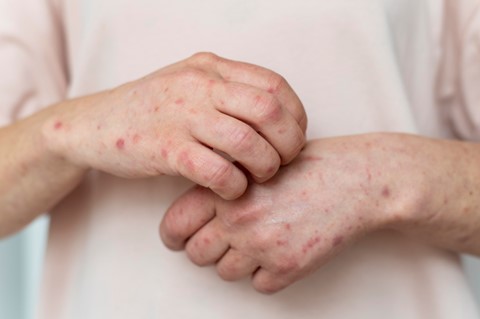Eczema, also known as atopic dermatitis, is a prevalent skin condition that affects millions of people worldwide. It is characterized by red, itchy, and inflamed patches on the skin. While the exact cause of eczema remains unknown, several factors contribute to its development. However, with proper understanding and management, individuals can find relief from its symptoms and improve their quality of life.
Symptoms of Eczema:
- Red, itchy, and inflamed patches on the skin
- Dry and sensitive skin
- Grayish patches
- Small bumps on the affected area
- Cracked or scaly skin
Eczema can occur at any age, but it is most seen in infants and children. It is often associated with a family history of the condition, asthma, or allergies, suggesting a genetic predisposition. Additionally, environmental factors such as irritants, allergens, and weather conditions can trigger or worsen eczema symptoms.
Managing eczema involves a two-pronged approach:
preventive measures and treatment.
Preventive measures: focus on avoiding triggers that exacerbate symptoms. This includes using gentle soaps and detergents, avoiding known allergens, and protecting the skin from extreme weather conditions. Additionally, keeping the skin well-moisturized with prescribed creams or emollients is essential to maintain its barrier function and prevent dryness.
Treatment Options for Eczema:
- Topical corticosteroids to reduce inflammation and relieve itching
- Non-steroidal creams (calcineurin inhibitors) for sensitive areas
- Oral medications for severe cases
- Phototherapy (light therapy) for some individuals
Beyond medication, lifestyle adjustments play a crucial role in managing eczema. Wearing loose-fitting clothing made of soft, breathable fabrics can help minimize skin irritation. Establishing a consistent skincare routine that includes gentle cleansing and moisturizing is essential. Additionally, stress management techniques, such as meditation or exercise, can contribute to overall well-being and potentially reduce eczema flare-ups.
It is important to seek guidance from a healthcare professional for an accurate diagnosis and personalized treatment plan. A dermatologist can provide valuable insights, recommend appropriate medications, and offer ongoing support throughout the management process. They can also help identify individual triggers and provide guidance on allergen avoidance.
In conclusion, eczema is a common and often bothersome skin condition characterized by red, itchy, and inflamed patches. While the exact cause of eczema is still unknown, a combination of genetic and environmental factors contributes to its development. By adopting preventive measures, following prescribed treatments, and making lifestyle adjustments, individuals with eczema can find relief from symptoms and improve their quality of life. Remember, consulting with a healthcare professional is vital to receive accurate diagnosis and tailored care.

